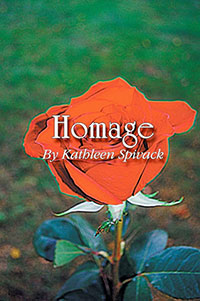 *
*
Review by Dennis Daly
Spanning oceans and multiple generations, Homage, Kathleen Spivack’s newest collection of poems, delivers a movable feast of poets and other influencers of her estimable artistry. Spivack’s narratives celebrate famous poets, musicians, painters, and booksellers, many of whom she personally knew and some before her time, as well as teachers, a lighthouse keeper, and other oddly interesting individuals.
Each of these poems seem perfectly weighted, upbeat, and toned with appreciation and even affection. Not an easy task given the ever-present and dark backstories of some of these fraught individuals.

Homage
By Kathleen Spivack
Wilderness House Press, Littleton, MA
ISBN: 978-1-7331185-3-843
Pages $12.00
Set in Elizabeth Bishop’s apartment in Cambridge Massachusetts, Spivack, in her poem Ping Pong Sestina for Elizabeth Bishop, recounts a ping pong match between Bishop and herself. The match is much more than a game of course. The metaphors of career and life and youth and age and talent mesh together in this slightly irregular (read personalized), but masterful, form. Bishop, who is known for writing a terrific sestina herself, would approve.
Spivack’s admiration for Bishop’s determination, despite her arthritic hands, powers up through this poem as she plots to throw the game to her adversary. This passion pushes the piece forward past Bishop’s many unsaid torments. Consider these affecting lines,
… You so easily wonfriends, admirers, yet always at play
was your encircled suffering, lack of love hinted, gamely
ignored; the poems and stories in which pain was handled
so far back behind the eyes that the poetry
stood for itself, was really poetry, not pain. You faced
it only obliquely. Once, showing me a photo, the face
of yourself as a baby, small, stubborn, not at all “poetic”
protesting abandonment in crumpled white lace, hands
tightly folded as if your dear life, even then, was not
a game, as if you sensed you had something dark to play
out, a despairing intelligence behind that winning
For Anne, Spivack’s amazing short poem lamenting the death of her poet-friend, Anne Sexton, seems to sear through its printed page. Yes, it has the necessary pathos. Yes, it is resentful of death. Yes, it provides a modicum of solace. But above all that, the piece affirms the friendship of the two poets and salutes Sexton’s life. The poem concludes this way,
Friend, from the phonograph you are still wise and true:
you go on talking, wry, amused.
No one could keep you from writing the poem-of-your-death
so I write a poem to your death, as you wanted me to.
Next stop Tours, France, in the lush Loire Valley. Spivack memorializes her former French teacher in her poem Madame Joelle Blot, my French Teacher. The piece is gorgeous and my favorite poem in the collection. One can almost smell the French language in the metaphoric lilac perfume flooding these well-wrought lines. Mentors with moral and/or emotional authority can often open interior doors in addition to the proper subjects they impart. This clearly is the case between Madame Blot and Spivack. Here is the heart of the poem,
Madame Joelle Blot, my French teacher, determined that
I should not spend another night without lilacs in my room.
Then you mouse-stepped down the ladder, little feet in little
strappy high-heeled shoes, set the lilacs firmly in a crate and
carried them inside, a bushel of lilacs. For me. No one
had ever… Selecting just the exact tool, you laid into the lilacs
with an enormous antique hammer, mashed down the woody
stem-ends splintery and flat. This is how it’s done, you showed me.
In France. Where they break eggs to make omelettes.
In Tours, where they speak the best French, unaccented
and pure, so they say. I wanted to learn that language from you.
I was foreign, foreign even to myself
And so applied myself diligently to your lessons.
Even the lilacs knew you were boss…
Many writers fantasize at one time or another about being a lighthouse keeper (I have.). The extreme seclusion coupled with grave and undeniable responsibility has its attraction. The Lighthouse Keeper, Spivack’s paean to that singular calling, does nothing to limit this allurement. She uses the Cape Antibes’ lighthouse on the French Riviera as her example. Listen to Spivack’s protagonist, enthroned in his glowing dome,
“I am in Paradise.
I live among the birds.
Sometimes I see angels:
I think I am becoming
an angel, drawn in a beam of
light, upward, spreading
hands over water, guiding ships.
If you listen, you can hear birds
also encouraging the sailors,
more benevolent than Ulysses’
sirens.”
If poetic romance and charm delights you, as well as mentoring power, muse upon Spivak’s poem, For George Whitman, Shakespeare & Co. Paris. Whitman was the proprietor of the second iteration of Shakespeare & Co., a gathering place for American expats, located in Paris, France. Described by Spivack as eccentric and generous, Whitman inspired and promoted his visitors and encouraged them in their writings. The poem exudes joy, possibility, and thankfulness, a far cry from the usual depressing caricatures inherent in literary life. The piece ends thusly,
… all roads led
to Shakespeare & Company. Always had. She looked
across the Seine. The vista took
one’s breath away: the bookshop; Paris spread
before her; conversation, Notre Dame….
To read to write, this was a writer’s dream.
All this, and more: the writer’s rooms, the cat,
the company, including lively Sylvia, she praised.
Few of us get to say thank you to friends, teachers, and mentors who have encouraged us along the way, either directly or indirectly. Kathleen Spivak, capping her storied career as poet, writer, and teacher, found an opportunity to express her homage to those who came before and, using her breath-taking artistry, took it. How refreshing!















Reader Comments